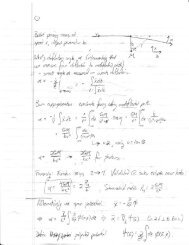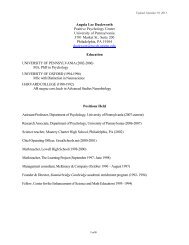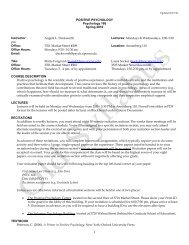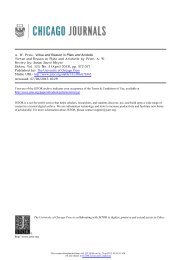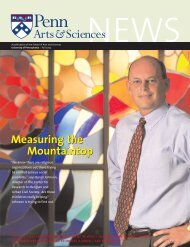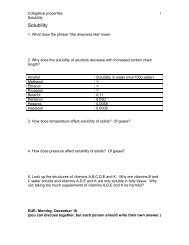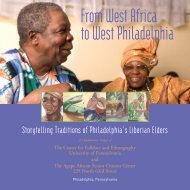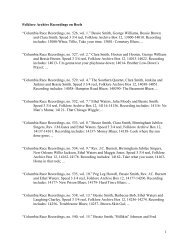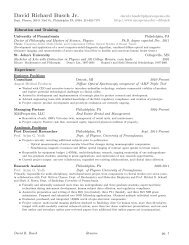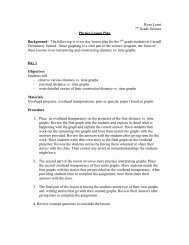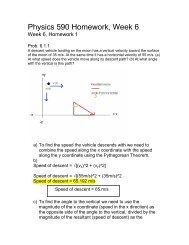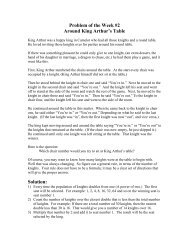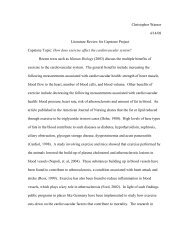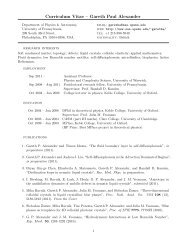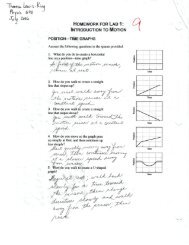PENN SUMMER - University of Pennsylvania
PENN SUMMER - University of Pennsylvania
PENN SUMMER - University of Pennsylvania
Create successful ePaper yourself
Turn your PDF publications into a flip-book with our unique Google optimized e-Paper software.
allowed it to function as an unusual kind <strong>of</strong> “public sphere” in which<br />
contemporary debates about race, class, gender, and sexuality are<br />
represented through visual and narrative forms. In this course we<br />
will examine the sitcom from institutional, aesthetic, and historical<br />
perspectives so as to understand its role in the negotiation <strong>of</strong> cultural<br />
change. Students will watch episodes <strong>of</strong> The Odd Couple, Leave It to<br />
Beaver, All in the Family, The Cosby Show, Roseanne, Friends and other<br />
sitcoms and read work in television scholarship.<br />
ClaSSiCal STUDieS<br />
ClsT 185 910 MTWr 1:00pm–2:45pm labuff<br />
Ancient Greek Political Thought: Past and<br />
Present<br />
Fulfills History & Tradition Sector, Cross-Cultural Analysis Course<br />
The way in which the Greeks understood and expressed their political<br />
institutions, activities, and challenges has deeply impressed<br />
our own conception <strong>of</strong> politics. This course will trace the history <strong>of</strong><br />
this ancient heritage from its inception to today, first through a close<br />
analysis <strong>of</strong> key texts from Thucydides, Plato, Aristotle, and Polybius,<br />
and then by considering several important moments in the reception<br />
<strong>of</strong> the Greek political tradition, from the Renaissance and American<br />
Revolution to the crisis <strong>of</strong> modernity and the Neo-Conservative<br />
Movement. We evaluate the relationship between distant and recent<br />
past as well as the influence <strong>of</strong> both on our own day.<br />
ClsT 200 936 Tr 4:30pm–6:30pm struck<br />
Greek and Roman Mythology<br />
This course is delivered in a fully online format in order to allow more<br />
flexibility for LPS students. Class sessions are <strong>of</strong>fered through a course<br />
website and include live lectures and interactive discussions through both<br />
direct messaging and voice over internet. Between classes, the learning<br />
experience is extended through assignments, threaded discussions and<br />
<strong>of</strong>fice hours. For additional information, please visit www.sas.upenn.edu/<br />
lps/online. Online course fee: $60.<br />
Fulfills Arts & Letters Sector / Crosslisted with: COML 200 936, FOLK 200 936<br />
Myths are traditional stories that have endured many years. Some <strong>of</strong><br />
them have to do with events <strong>of</strong> great importance, such as the founding<br />
<strong>of</strong> a nation. Others tell the stories <strong>of</strong> great heroes and heroines<br />
and their exploits and courage in the face <strong>of</strong> adversity. Still others<br />
are simple tales about otherwise unremarkable people who get into<br />
trouble or do some great deed. What are we to make <strong>of</strong> all these tales,<br />
and why do people seem to like to hear them? This course will focus<br />
on the myths <strong>of</strong> ancient Greece and Rome, as well as a few contemporary<br />
American ones, as a way <strong>of</strong> exploring the nature <strong>of</strong> myth and<br />
the function it plays for individuals, societies, and nations. We will<br />
also pay some attention to the way the Greeks and Romans themselves<br />
understood their own myths. Are myths subtle codes that contain<br />
some universal truth? Are they a window on the deep recesses <strong>of</strong><br />
a particular culture? Are they entertaining stories that people like to<br />
tell over and over? Are they a set <strong>of</strong> blinders that all <strong>of</strong> us wear, though<br />
we do not realize it? Investigate these questions through a variety <strong>of</strong><br />
topics creation <strong>of</strong> the universe between gods and mortals, religion<br />
and family, sex, love, madness, and death.<br />
CoMMUniCaTionS<br />
CoMM 237 910 TBa Martinez<br />
Health Communication<br />
An examination <strong>of</strong> the influence <strong>of</strong> public health communication on<br />
health behavior. The course considers: intervention programs addressing<br />
behaviors related to cancer, cardiovascular disease, HIV/AIDS,<br />
drug use, obesity and others; theories <strong>of</strong> health behavior change; issues<br />
in the design <strong>of</strong> effective health communication programs; concerns<br />
about the portrayal <strong>of</strong> health and medicine on mass media.<br />
CoMM 300 910 MW 1:00pm–4:10pm Crocco<br />
Public Space, Public Life<br />
Public space as a communicative arena. Historical aspects, varieties<br />
<strong>of</strong> public space, public space as a cultural signifier, how public space<br />
facilitates or hinders common life, public space as a component <strong>of</strong><br />
democracy.<br />
eConoMiCS<br />
eCon 001 910 MTWr 10:40am–12:15pm staff<br />
Introduction to Economics: Microeconomics<br />
Fulfills Society Sector<br />
Introduction to economic analysis and its application. Theory <strong>of</strong> supply<br />
and demand, costs and revenues <strong>of</strong> the firm under perfect competition,<br />
monopoly and oligopoly, pricing <strong>of</strong> factors <strong>of</strong> production,<br />
income distribution, and theory <strong>of</strong> international trade.<br />
eCon 002 910 MTWr 1:00pm–2:35pm staff<br />
Introduction to Economics: Macroeconomics<br />
Prerequisite(s): ECON 001 / Fulfills Society Sector<br />
Introduction to economic analysis and its application. An examination<br />
<strong>of</strong> a market economy to provide an understanding <strong>of</strong> how the<br />
size and composition <strong>of</strong> national output are determined. Elements<br />
<strong>of</strong> monetary and fiscal policy, international trade, economic development,<br />
and comparative economic systems.<br />
eCon 101 910 MTWr 2:40pm–4:15pm staff<br />
Intermediate Microeconomics<br />
Prerequisite(s): ECON 001, 002; MATH 104 AND MATH 114 OR 115<br />
Theories <strong>of</strong> consumer behavior, demand, production, costs, the firm<br />
in various market contexts, factor employment, factor incomes, elementary<br />
general equilibrium, and welfare.<br />
eCon 103 910 MTWr 9:00am–10:35am staff<br />
Statistics for Economists<br />
Prerequisite(s): ECON 001, 002; MATH 104 AND MATH 114 OR 115<br />
The course focuses on elementary probability and inferential statistical<br />
techniques. The course begins with a survey <strong>of</strong> basic descriptive<br />
statistics and data sources and then covers elementary probability<br />
theory, sampling, estimation, hypothesis testing, correlation, and<br />
regression. The course focuses on practical issues involved in the<br />
substantive interpretation <strong>of</strong> economic data using the techniques <strong>of</strong><br />
statistical inference. For this reason empirical case studies that apply<br />
the techniques to real-life data are stressed and discussed throughout<br />
the course, and students are required to perform several statistical<br />
analyses <strong>of</strong> their own.<br />
<strong>SUMMER</strong> SESSIOn I • MAY 24–JULY 2, 2010 17



